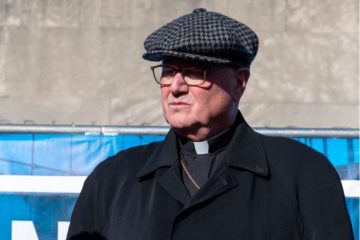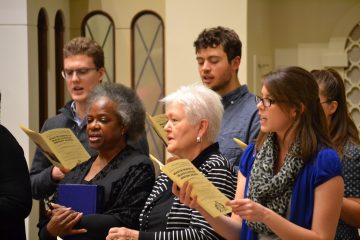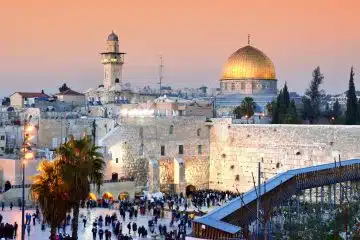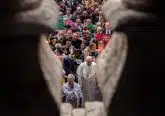Rural areas provide fertile ground for crops and for priestly vocations
By Doug Weller Catholic News Service
SALINA, Kan. — Cardinal Timothy M. Dolan of New York says one of the virtues of rural life is the number of priests who come from country parishes.
The Diocese of Salina would seem to confirm that.
Of its 53 active and retired diocesan priests, 26 grew up in a parish of fewer than 150 families. Of the current seminarian class of 14 men, four are from rural parishes.
Several priests who grew up in rural parishes all spoke to The Register, Salina’s diocesan newspaper, of feeling a closeness to the land, nature and to God that, in turn, opened their hearts to the priesthood.
“There is a natural closeness to dependency on God in the rural setting,” said Father Kerry Ninemire, who grew up in St. Joseph Parish in New Almelo. “Our lives were so dependent on the elements that our minds were often naturally on God.”
Traditionally, he noted, rural families had larger families, and “in the past vocations tended to come from larger families.”
He also spoke of the closeness of rural parishioners.
“That was very true for me. Unconsciously but nevertheless very true, I sought to find a place to experience that closeness in my adult life. The seminary experience provided that in my younger days, and I have found it in the priesthood with my brother priests, the sisters and the people of the parish,” said Father Ninemire, who celebrates his 40th anniversary in the priesthood this year. Currently, he is pastor of St. Francis Xavier Parish in Junction City and vicar general for the diocese.
Father Don Zimmerman said his parents encouraged each of their seven children to consider a religious vocation.
“I think the rural environment provides the fodder for hard work and the desire to do what is necessary to bring others to Christ and to the church. The rural life also teaches one to be flexible and adaptable, while remaining true to principles. It also teaches that all efforts are not successful and that there is always ‘a better crop next year’ as the mantra for a farmer,” he continued.
“I have found that is also true in ministry, when not all efforts are successful, nor are they all appreciated at the time. But one is required to remain true to church’s teachings, especially to the sacraments,” he said.
He, too, mentioned the need for rural neighbors to get along and work together.
“One never knows when you may need them and always be available to assist them when in need. We had neighbors who were Mennonite and of other faiths. I learned very early the importance of respecting one another’s differences while I was on the farm and have cultured that spirit in the 40-plus years of ministry,” he said.
A rural lifestyle also teaches there is no problem that cannot be solved, especially with meager resources,” Father Zimmerman added.
“The stick-to-it principle has guided me, based on the rural environment of my early age.”
Father Zimmerman, ordained in 1973 at his home parish in Collyer, is currently pastor of St. Thomas More Parish in Manhattan.
Father Norbert Dlabal, who at 79 is the oldest active priest in the diocese, said he believes rural life is a fertile environment for a spiritual life.
“St. Paul wrote to the Romans that, ‘since the creation of the world, invisible realities, God’s eternal power and divinity have become visible, recognized through the things he has made,'” he said.
“I just think when a person is immersed daily in ‘the things he has made’ and experiences them at close range, like getting dirt under one’s fingernails and feeling the ground under one’s feet and smelling the aroma of freshly overturned soil and other scents of nature that come drifting in the wind, or shivering when it gets cold and sweating when it gets hot,” he continued, “it can’t help but trigger a sort of incipient mystical experience, especially when one is already a member of a family of faith,” he said.
“I think that these are some of the underlying reasons why rural life has obviously proven to be favorable to the ability to listen to the voice of the Lord and to follow his ways,” said Father Dlabal, who currently is pastor of Our Lady of Perpetual Help Parish in Goodland, and Holy Ghost Parish in Sharon Springs.
Father Dlabal grew up near Wilson and was ordained in 1972 in his home parish of St. Wenceslaus in Wilson.
“What I heard proclaimed in the church and what I heard proclaimed in nature was one and the same, because it was the truth. In that way I was introduced to life, and, of course, to God, and so yes, I cherish both. I always have and always will cherish both: the faith and the land.”
Msgr. James Hake, who grew up in St. Boniface Parish in Tipton, said, “A couple decades ago or so, I would think that more vocations came from smaller and rural towns or parishes because life in those places was more simple, less challenging and more rooted in nature.
“People closer to the farms and ranches commune with nature and often tend to be more inclined to be in touch with God,” he added. “Life in the rural areas is often less stressful and more oriented to community, including the community of the church.”
Posted March 2, 2015













